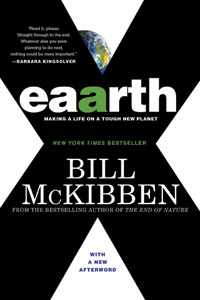Last year I was
lucky enough to take a college level, environmental science class which brought my attention to the multiple problems the Earth is facing. More specifically, the problem humans have created for the Earth and now themselves. Many
aspects of that class focused on how we are greatly impacting and altering
the earth. These changes are permanent and are virtually impossible to reverse,
proving to be a real issue that needs to be attended to today. In 2010,
Bill McKibben wrote the novel Eaarth which focuses heavily on the fact that
these changes in the environment are going to become “normal,” and that we will
have to adapt to these as best we can.
While reading
this first chapter my mind immediately jumped to one of my favorite movies,
Interstellar. Interstellar came out in 2014 and is a science fiction film that depicts
an earth that is becoming more and more unstable, resulting in humans having to
find a new home, on another plant, or even in another universe. McKibben
states, “…researchers calculated that the new aridity and heat have led to
reductions in wheat, corn, and barley yields of about 40 million tons a year.” This
is eerily similar to what occurs in the movie Interstellar, many of the crops
die out until they are only left with corn for a source of food. Also, there
are wild dust storms in the film which match up with the extreme forms of
weather described in Eaarth as well.
 The interesting
thing about this connection is that in Eaarth, is seems that corn crop production
is decreasing significantly over other crops, yet it is the crop that survived
the longest in Interstellar. Why would the film industry choose to not use real
world data to provide an even more real depiction of the changes of Earth? It
is just food for thought, and what seemed odd to me while I read this novel.
The interesting
thing about this connection is that in Eaarth, is seems that corn crop production
is decreasing significantly over other crops, yet it is the crop that survived
the longest in Interstellar. Why would the film industry choose to not use real
world data to provide an even more real depiction of the changes of Earth? It
is just food for thought, and what seemed odd to me while I read this novel.
Finally, the way
McKibben presents his information is in a very realistic and concerning way.
Our home, planet Earth, has been changed permanently because of the human race.
There is no going back now, the Earth people knew years and years ago is gone, and we will have to live with the consequences. He closes with the concept
that we have changed the Earth, and now it is making us change with it. “That’s
life on our new planet. That’s where we live now.”



I loved that movie as well but for some reason did not make the connection when reading. Now that you've pointed this out, I can't see how I missed. When I first saw the movie, I thought maybe it was a stretch and just a catchy plot, little did I know that we are in actual danger of this happening.
ReplyDeleteI'm not sure that we live on a new planet compared to what we have in the past. However, McKibben does provide plenty of statistics that suggest that we may be having a significant impact on the atmosphere. I like how he also includes some anecdotal pieces to freshen it up for the reader so that they can get a better understanding.
ReplyDeleteI agree that Mckibben provided a lot of information spelling out the end of the world as we know it. While reading the chapter I found myself believing everything he was saying, mainly because of the realistic and concerning way in which he presented his evidence, and had to keep reminding myself that there are two sides to every story and to take what he was saying with a grain of salt. There is no doubt in my mind that global warming is real, but I feel like it is too soon for me to believe everything he is predicting will come true.
ReplyDeleteI've never seen Intersteller but there is actually a whole genre of film and books called "cli-fi" and instead of science-fiction it's climate change-fiction.
ReplyDelete